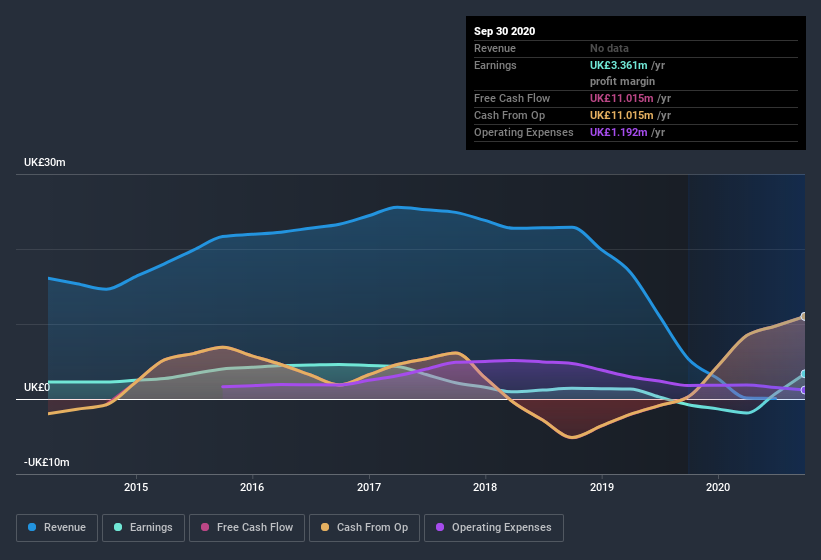- United Kingdom
- /
- Capital Markets
- /
- AIM:ASTO
Robust Earnings May Not Tell The Whole Story For AssetCo (LON:ASTO)

AssetCo plc's (LON:ASTO) robust recent earnings didn't do much to move the stock. We think this is due to investors looking beyond the statutory profits and being concerned with what they see.
See our latest analysis for AssetCo

A Closer Look At AssetCo's Earnings
Many investors haven't heard of the accrual ratio from cashflow, but it is actually a useful measure of how well a company's profit is backed up by free cash flow (FCF) during a given period. In plain english, this ratio subtracts FCF from net profit, and divides that number by the company's average operating assets over that period. You could think of the accrual ratio from cashflow as the 'non-FCF profit ratio'.
Therefore, it's actually considered a good thing when a company has a negative accrual ratio, but a bad thing if its accrual ratio is positive. While it's not a problem to have a positive accrual ratio, indicating a certain level of non-cash profits, a high accrual ratio is arguably a bad thing, because it indicates paper profits are not matched by cash flow. That's because some academic studies have suggested that high accruals ratios tend to lead to lower profit or less profit growth.
Over the twelve months to September 2020, AssetCo recorded an accrual ratio of -0.89. That indicates that its free cash flow quite significantly exceeded its statutory profit. To wit, it produced free cash flow of UK£11m during the period, dwarfing its reported profit of UK£3.36m. AssetCo shareholders are no doubt pleased that free cash flow improved over the last twelve months. However, that's not the end of the story. We can look at how unusual items in the profit and loss statement impacted its accrual ratio, as well as explore how dilution is impacting shareholders negatively.
Note: we always recommend investors check balance sheet strength. Click here to be taken to our balance sheet analysis of AssetCo.
One essential aspect of assessing earnings quality is to look at how much a company is diluting shareholders. In fact, AssetCo increased the number of shares on issue by 7.0% over the last twelve months by issuing new shares. That means its earnings are split among a greater number of shares. To celebrate net income while ignoring dilution is like rejoicing because you have a single slice of a larger pizza, but ignoring the fact that the pizza is now cut into many more slices. Check out AssetCo's historical EPS growth by clicking on this link.
A Look At The Impact Of AssetCo's Dilution on Its Earnings Per Share (EPS).
We don't have any data on the company's profits from three years ago. And even focusing only on the last twelve months, we don't have a meaningful growth rate because it made a loss a year ago, too. What we do know is that while it's great to see a profit over the last twelve months, that profit would have been better, on a per share basis, if the company hadn't needed to issue shares. Therefore, the dilution is having a noteworthy influence on shareholder returns.
In the long term, if AssetCo's earnings per share can increase, then the share price should too. However, if its profit increases while its earnings per share stay flat (or even fall) then shareholders might not see much benefit. For that reason, you could say that EPS is more important that net income in the long run, assuming the goal is to assess whether a company's share price might grow.
The Impact Of Unusual Items On Profit
While the accrual ratio might bode well, we also note that AssetCo's profit was boosted by unusual items worth UK£4.6m in the last twelve months. While we like to see profit increases, we tend to be a little more cautious when unusual items have made a big contribution. When we crunched the numbers on thousands of publicly listed companies, we found that a boost from unusual items in a given year is often not repeated the next year. And, after all, that's exactly what the accounting terminology implies. AssetCo had a rather significant contribution from unusual items relative to its profit to September 2020. All else being equal, this would likely have the effect of making the statutory profit a poor guide to underlying earnings power.
Our Take On AssetCo's Profit Performance
In conclusion, AssetCo's accrual ratio suggests its earnings are well backed by cash but its boost from unusual items is probably not going to be repeated consistently. Meanwhile, the dilution was a negative for shareholders. After taking into account all the aforementioned observations we think that AssetCo's profits probably give a generous impression of its sustainable level of profitability. If you want to do dive deeper into AssetCo, you'd also look into what risks it is currently facing. Our analysis shows 5 warning signs for AssetCo (2 don't sit too well with us!) and we strongly recommend you look at these before investing.
Our examination of AssetCo has focussed on certain factors that can make its earnings look better than they are. And, on that basis, we are somewhat skeptical. But there are plenty of other ways to inform your opinion of a company. For example, many people consider a high return on equity as an indication of favorable business economics, while others like to 'follow the money' and search out stocks that insiders are buying. So you may wish to see this free collection of companies boasting high return on equity, or this list of stocks that insiders are buying.
When trading AssetCo or any other investment, use the platform considered by many to be the Professional's Gateway to the Worlds Market, Interactive Brokers. You get the lowest-cost* trading on stocks, options, futures, forex, bonds and funds worldwide from a single integrated account. Promoted
New: Manage All Your Stock Portfolios in One Place
We've created the ultimate portfolio companion for stock investors, and it's free.
• Connect an unlimited number of Portfolios and see your total in one currency
• Be alerted to new Warning Signs or Risks via email or mobile
• Track the Fair Value of your stocks
This article by Simply Wall St is general in nature. It does not constitute a recommendation to buy or sell any stock, and does not take account of your objectives, or your financial situation. We aim to bring you long-term focused analysis driven by fundamental data. Note that our analysis may not factor in the latest price-sensitive company announcements or qualitative material. Simply Wall St has no position in any stocks mentioned.
*Interactive Brokers Rated Lowest Cost Broker by StockBrokers.com Annual Online Review 2020
Have feedback on this article? Concerned about the content? Get in touch with us directly. Alternatively, email editorial-team (at) simplywallst.com.
About AIM:ASTO
AssetCo
Engages in acquiring, managing, and operating asset and wealth management activities and interests.
Flawless balance sheet with moderate growth potential.

